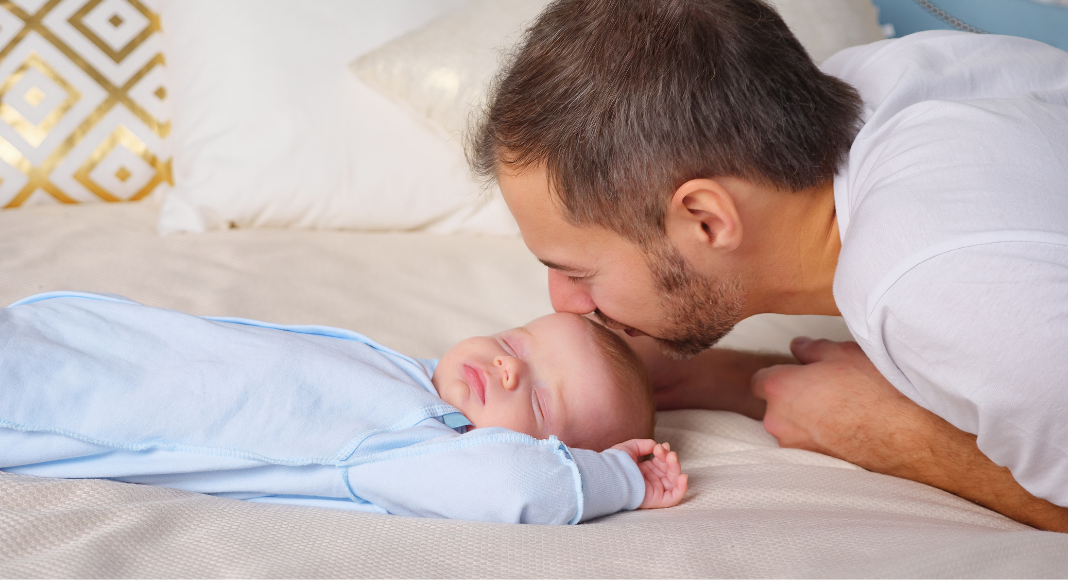 We’ve all heard the adage “never wake a sleeping baby,” and when our little ones are snoozing, we’re almost always going to be reluctant to disturb them. The truth is, though, that in some circumstances, waking your child up is necessary and can be useful in correcting a number of common baby and toddler sleep problems.
We’ve all heard the adage “never wake a sleeping baby,” and when our little ones are snoozing, we’re almost always going to be reluctant to disturb them. The truth is, though, that in some circumstances, waking your child up is necessary and can be useful in correcting a number of common baby and toddler sleep problems.
So when should you wake a sleeping baby?
1. If your newborn is sleeping through feeds.
Newborns need to eat every few hours in the first weeks of life, so you may need to wake your newborn up sometimes for feeding, especially if they’re sleeping for more than three or four hours at a time. Once your baby has demonstrated a pattern of solid weight gain, your pediatrician may tell you that you can stop waking your baby and feed on demand instead. Still, I always recommend that parents continue to wake their babies during the day for feeds. Ensuring that your baby gets the calories, they need during the day will encourage longer stretches of sleep at night and help their internal clocks adjust to life outside the womb.
If you’re unsure about your newborn’s feeding patterns or are establishing your milk supply, your pediatrician or lactation consultant can offer specific recommendations to ensure that your newborn is getting the calories they need to grow and thrive.
2. If your child is napping too long or too late in the day.
Sleep is disorganized in the first few months of life, but by three or four months of age, babies begin to develop more predictable sleep patterns, and too much daytime sleep can start to interfere with their ability to sleep well at night. If your child is getting significantly less than the average amount of nighttime sleep, limiting naps may be necessary to create a better balance between day and night sleep. If your child is short on night sleep, my article on naps outlines average sleep requirements and awake windows and can help you determine if your child’s nap schedule might need to be adjusted.
Napping too late in the day can also interfere with your child’s ability to sleep well at night because it tends to push bedtime later and result in insufficient nighttime sleep. For babies under six or seven months of age, a catnap ending at 5:00 p.m. or even 5:30 p.m. won’t necessarily impact bedtime. Still, by eight or nine months of age, when most babies are only napping twice a day, it’s usually best to end naps by 4:00 p.m. to protect bedtime.
3. If your child’s morning wake up time varies significantly from day to day.
Minor variations in bedtimes and morning wake times aren’t a problem for most children, but major fluctuations throughout the week (more than 30/40 minutes) often result in irregular schedules and makes it difficult to establish the kind of consistency that encourages better sleep. Starting the day at about the same time every day, even on weekends, will help regulate your child’s internal clock, which is an important component of healthy sleep. If you’re unsure about what time your baby should be going to bed, start with their morning wake-up time and count backward the number of hours of sleep they need at night. For example, if your child needs 11 hours of sleep at night and gets up for the day at 6:30 a.m., they should be asleep by 7:30 p.m. to get the amount of sleep they need to be well-rested.
4. If your child is starting a nap transition
Nap transitions can be challenging because children tend to become overtired, which can lead to trouble falling asleep and staying asleep throughout the night. Managing your child’s naps – for example, limiting a morning nap to be sure another nap can happen – can help your child make it until bedtime without becoming overtired. Even a short catnap in the afternoon can eliminate the need for super early bedtimes, which can be helpful if implemented occasionally but aren’t a long term solution.
5. If your child has persistent, extended wake ups
Some children develop a pattern of being up for an hour or more in the middle of the night every single night. They’re wide awake, usually happy, and no matter what you do, you can’t get them to go back to sleep. After playing, talking, and doing laps around the crib, they fall back to sleep and stay asleep until morning.
If your child has fallen into a similar pattern, you’re probably dealing with what sleep experts call a split night.
Split nights are typically caused by one of the following reasons – poor napping that leads to extra early bedtimes and developmental milestones like crawling, walking, and talking. You may be tempted to allow your child to sleep in after these wakeful sessions, but correcting a split night actually involves restricting the amount of time your child spends in their crib so that they can fill that time with sleep. That means working on naps, shifting your child’s bedtime later, and waking them up earlier in the morning.
Here’s an example of how to adjust the schedule of a toddler with split nights.
Let’s say that your toddler has been napping poorly – just one hour from 12:30 until 1:30 p.m. every day. Because they’re exhausted, you’ve been putting them to bed extra early at 6:30 p.m. They fall asleep immediately, sleep until 2:00 a.m., and then proceed to play in their crib for two hours before they fall back to sleep until 7:30 a.m. Your child is getting eleven hours of sleep at night, which is the average requirement, but they’re spending thirteen hours in the crib.
To solve the problem, you would need to start by working on extending their nap to go to bed an hour later – at 7:30 p.m. (Working on naps is a must – without better daytime sleep, the problem will persist). You would then wake them up for the day after eleven hours, at 6:30 a.m., and expose them to lots of natural light to reset their internal clock. Then another good nap, another 7:30 p.m. bedtime, and another 6:30 wake up, and so on. Middle of the night wake-ups may persist for another five or six nights, but if you’re consistent, your child’s circadian rhythm and sleep pressure drive will “reconnect,” and they will be back to sleeping through the night.
Sweet Dreams!
Alison Bevan – Sleepytime Coach
Pediatric Sleep Specialist – The Center For Advanced Pediatrics

























